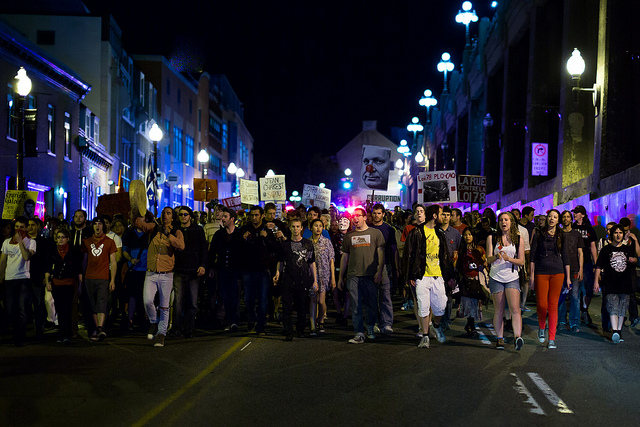Like this article? rabble is reader-supported journalism. Chip in to keep stories like these coming.
Speaking as a former student protester, I’d say what’s useful to keep in mind about the current round, is that these are protests by students, i.e., people at a certain stage in life. I’d better swiftly add that I don’t mean this invalidates the protesters’ claims, any more than the fact that, because sexual feelings arise during puberty, whatever was garnered during that phase must eventually seem outdated. Au contraire, there may be many points in later life when you’d do well to recall things you discovered then.
Recent protests include national student revolts in South Africa and Quebec against tuition rises, which resulted in rollbacks and even the defeat of a government. The current University of Missouri uproar is different: it’s at one university and it’s not about economic self-interest, it’s about racial injustice — influenced by events in nearby Ferguson. Thus do ripples spread.
Black students demanded change, their (stereotypically) arrogant president was unresponsive. A grad student went on hunger strike — adding an unusual, Gandhian note. Black players on the football team seemed deeply moved by his gesture and said they wouldn’t play. White teammates supported them. The coach, a true big man on campus — he makes $4 million per year versus the president’s mere half-mill — backed the players. And the president quit. Similar upheavals are now occurring across the U.S.
The counterattack from MSM pundits and other grown-ups splits in two streams: a schoolyard version that abhors “political correctness run amok,” like a student demand that the president “acknowledge his white male privilege”; a more sophisto version claiming threats to free speech, e.g., protesters stopped a photographer from working because they wanted to maintain a “safe space.”
For the most part, I find these adult critiques of the young insufferably smug. Take the New York Times’ “liberal” Nick Kristof: “We should cherish all kinds of diversity, including the presence of conservatives to infuriate us liberals and make us uncomfortable.” It isn’t easy to sound that complacent while praising discomfort. If you already know the conclusions of complex political debates, why send the kids to class at all? Just give them the cheat sheet.
But my heavier point is the stage-of-life thing. Students enter their society’s moral and political morasses with minds that are fresh and churning. They’re discovering the excitement of being able to conceptualize notions like injustice. What they lack is the range of life experience everyone acquires over time so they tend to focus narrowly on words and ideas. They fasten on terms like “microaggressions” and see how much use they can wring from them. They tend to overdo lingo while accumulating background against which to test their exhilarating formulations. In other words, they’re students, they’re learning. (Missouri students, for instance, now say they regret barring the photographer.)
As time passes, they’ll try to integrate the components. That doesn’t necessarily mean losing the politics but it might mean changing their forms of expression and their approach to action. It’s fine if the old want to pass on their advice to the young but they should do so hesitantly since the world is never now as it used to be a short while ago, so every generation has to make its way.
It’s often undergrads who lead protests, which makes sense. They haven’t cemented their futures yet, and have a license to explore intellectually and politically. Or at least it should work that way. A Missouri student leader said she resents being asked for solutions alongside the protests. She says she’s already too busy studying and working, to do the job of their overpaid administrators.
Hannah Arendt, whom I knew during my time of student protest, had the amazing thought that every human birth is an utterly new beginning for the species. This is the opposite of history as a burden or obligation. We — humanity — have these perpetual opportunities to start from scratch and get it right, even if we never do. Maybe that’s why student protests always seem to come as a surprise. No one expected it from this (or that) generation, yet there they go. KABOOM. Wasn’t Obama’s lack of achievement in racial matters thought to have disheartened racial justice fighters? Instead they seem to be taking it as an encouragement: Look, he failed. That means there’s something left for us to do!
This column was first published in the Toronto Star.
Photo: flickr/ Doug Tanner



